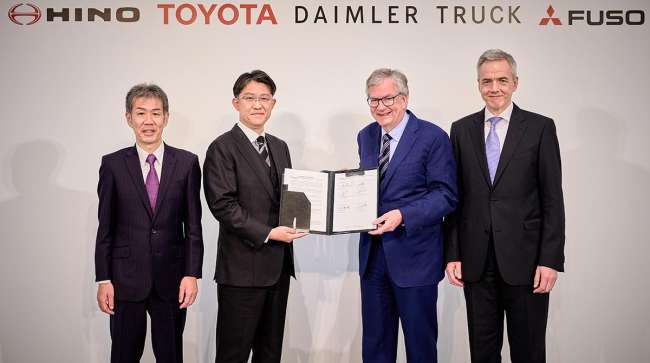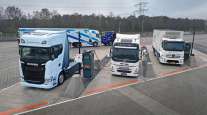Staff Reporters
Daimler Truck, Toyota, Others Join Forces on Ecological Tech

[Stay on top of transportation news: Get TTNews in your inbox.]
Daimler Truck will merge its Japanese Mitsubishi Fuso Truck and Bus Corp. unit with Hino Motors as part of an ecological tech alliance forged with Hino parent Toyota Motor Corp., the companies said May 30.
Daimler Truck Holding, Mitsubishi Fuso, Hino and Toyota jointly announced the merger after concluding a memorandum of understanding focused on accelerating the development of advanced technologies. The focus will be on environmental, autonomous, connected and electric mobility technologies. They also aim to strengthen their commercial vehicle business globally.
“We at Daimler Truck are very proud of our products, because trucks and buses keep the world moving,” Daimler Truck CEO Martin Daum said. “And soon they will even do so with zero emissions.
“So there is a great future ahead — and today’s announcement is a crucial step in making that future work economically and in leading sustainable transportation. The planned new company will be a major force in Southeast Asia and an important associate of the Daimler Truck family.”
Daimler Truck, @FusoOfficial, Hino & @ToyotaMotorCorp conclude an MoU on accelerating development of Advanced Technologies and merging Mitsubishi Fuso and Hino Motors.
Watch the press conference here: https://t.co/af7fw2x5Fr
Read more: https://t.co/1EvtIY0m57#DaimlerTruck pic.twitter.com/txAdIN6UOv — Daimler Truck AG (@DaimlerTruck) May 30, 2023
Daimler and Toyota plan to contribute an equal investment into the holding company for the merger. They also plan to collaborate on the development of hydrogen reduction and other technologies to support the competitiveness of the new company. The merger aims to create synergies to advance their technological and global market plans.

Daum
“This collaboration among our four companies is a partnership for creating the future of commercial vehicles in Japan and the future of mobility society,” Toyota CEO Koji Sato said. “Our four companies will work together with a shared vision of achieving carbon neutrality by strengthening CASE technologies and of changing the future of commercial vehicles and building the future together by solving social issues.”
Details on the scope and nature of the collaboration including the name, location, shareholding ratio and corporate structure of the new holding company will be decided over the next 18 months. The parties hope to sign a definitive agreements in the first quarter of 2024. They also aim to close the transaction by the end of next year.
“We will unite our aspirations to ‘support mobility and contribute to society’ and, hand in hand, accelerate advanced technology development in order to overcome the increasingly fierce global competition,” Hino CEO Satoshi Ogiso said. “Through these efforts, we will strive to tackle societal challenges such as achieving carbon neutrality.”
Morgan Stanley MUFG Securities Co. noted in a report after the announcement that the upside risks to the deal are higher-than-expected new vehicle sales in North America, yen depreciation, and expansion of the motorcycle market in Asia. The downside risks are sharper-than-expected growth in raw material prices, more widespread irregularities in vehicle inspections at domestic sales companies and associated harm to brand image.
“The firms aim to collaborate in technological development, such as electrification and self-driving, as well as in production and procurement,” Morgan Stanley auto analyst Shinji Kakiuchi wrote in the report. “They are also focusing on the utilization of hydrogen technology to reduce CO2 emissions. For large and heavy trucks, [fuel cell electric vehicles] that use hydrogen fuel to generate power may be more suitable compared to [battery-electric vehicles] that need high-capacity batteries.”
Hino is working to rebuild its stature in the industry after the company’s disclosure last year that it had falsified emissions data beginning as early as 2003.
AlsterResearch released a report noting the risks that situation brings to this deal.
“The deal could prove to be a bargain for Daimler Truck, but it comes with significant risks,” AlsterResearch analyst Oliver Wojahn wrote in the report. “Hino recently admitted to decades of fraud involving falsified engine emissions and fuel efficiency data, suggesting a broken corporate culture, and revenues have been declining for years. A binding definitive agreement setting out all relevant details of the transaction is expected in Q1 ’24.”
AlsterResearch also noted the shares of the new company are expected to be listed on the Tokyo Stock Exchange upon completion of the deal. It added the transaction is subject to board approval and other conditions and is not expected to close before the end of 2024.
Want more news? Listen to today's daily briefing below or go here for more info:




